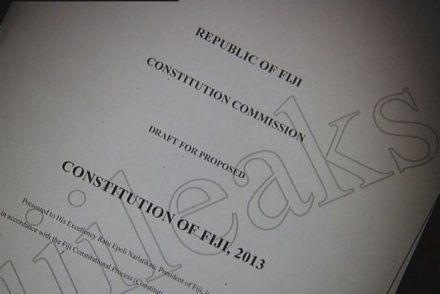
AUCKLAND (Radio New Zealand International / Pacific Media Watch): New Zealand Prime Minister John Key says the release of Fiji’s new constitution is a “positive step, even if it is not perfect”.
Foreign Minister Murray McCully said the new constitution was part of practical progress in Fiji towards elections.
He said he hoped Suva looked at some of the constitution’s aspects more carefully, but said New Zealand wanted to look positively at current developments in Fiji..jpg)
Since 2012 “we’ve seen quite a lot of progress, seen four political parties registered to contest the elections, we’ve seen very practical progress being made”, McCully told Radio New Zealand International’s Jane Patterson.
“I’m advised that there’s quite a lot of work to be done, so there’ll be things that we can definitely do. I think over the coming weeks you’ll see a new government elected in Australia, you’ll see the Pacific Islands Forum leaders meet in Majuro, there’ll an opportunity to think about the steps that appropriately should be taken if that progress in Fiji continues,” the Foreign Minister said.
Feleti Teo, deputy Secretary-General of the Pacific Islands Forum Secretariat, told Islands Business that Fiji's suspension from the annual summit would be a priority subject at the Forum.
Teo said the public release of Fiji's constitution and the finalisation of election registration were developments pointing strongly towards elections next year.
"The question then for leaders is what happens to Fiji, because obviously elections will be an activity that will satisfy the condition of the suspension...They have to determine whether they should act now given the political developments to date and consider inviting Fiji back or wait until the elections," he said.
Forum comeback
Teo said when Fiji was suspended in 2009, leaders agreed that Fiji would be invited back if the government of Prime Minister Voreqe Bainimarama was able to demonstrate the country was progressing towards democratic rule.
"Given all the developments to date, leaders should decide whether they wait until elections next year or if they are satisfied they can take a decision now in anticipation of elections next year," said Teo.
Fiji unveiled its final version of the 2013 Constitution on August 22, with President Ratu Epeli Nailatikau scheduled to give his assent to it on Thursday.
The new constitution, which replaces the 1997 Constitution that was abrogated in 2009 after the 2006 coup, is expected to pave the way for the 2014 parliamentary election that the government has pledged to hold.
McCully said there still were parts of the constitutions he would like to be improved.
“I’d simply say there are still some aspects of the constitution we hoped they’ll discuss further and look at more carefully.
But we want to look positively at what’s going on there. Progress is being made towards the machinery for elections and the ground rules for elections in the form of the constitution, and we want to support that process in every way we can.”
Coup pardon
The provision in the new constitution giving a pardon for any action towards historic coups and related actions since 2000, was not well received by the New Zealand government, according to Fiji Village.
However, in the RNZI interview, McCully emphasised that New Zealand needed to be “part of the solution, rather than part of the problem”.
“I think the solution here is the holding of elections and we need to focus firmly on helping them get across that line.
I think there’ll be some issues in the constitution debate that we hope will attract further attention there, but over all we want to try and see the machinery for elections put in place.
We want the elections to be free and fair. And to the extent that there are fine-tuning issues to be dealt with going forward, there’ll be some time to do that.”
Read more about the new Fijian constitution
This work is licensed under a Creative Commons Attribution-NonCommercial 3.0 New Zealand Licence.




